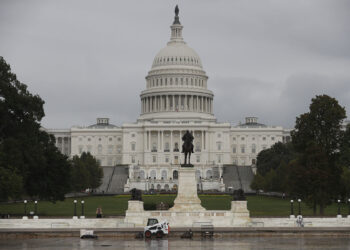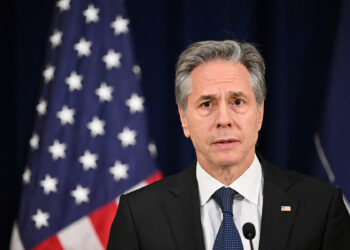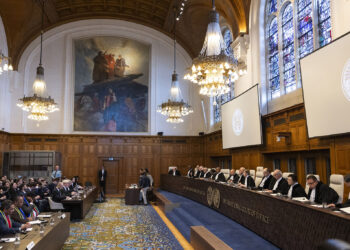For decades, U.S. policy toward the Middle East has contributed to massive violations of human rights and international humanitarian law and has suppressed attempts at democracy and accountability. Through military, financial and diplomatic support, the United States is propping up autocratic regimes that oppress their people, while invoking the goal of "promoting human rights and democracy" to justify direct and indirect military interventions and broad, punitive economic sanctions.
When I got to America, I asked myself why do these people like to have freedom but they don't like for people in the Middle East to have freedom?
-Hossam al-Motaim, Egyptian democracy activist
DAWN's foreign policy recommendations are guided by the principle, Do No Harm. As a first step, the U.S. should cease its support of governments that engage in systematic and widespread human rights abuses, including torture, attacks against civilians, repression of freedom of expression and squashing of political dissent. U.S. policy makers should also exercise humility in determining what is "best" for Arab countries and avoid interventions aimed at regime change. U.S. policy should be guided by international law and the insights of human rights activists and political dissidents from the region – the very people who have suffered as a result of U.S. support for oppressive regimes. In taking proactive measures, the U.S. should act multilaterally wherever possible.
Principles for U.S. Policy:
- Follow international law.
- Demand human rights compliance from all actors, whether friends or foes.
- Act multilaterally.
First, follow the law.
The U.S. should abide by its obligations under human rights law and the laws of war in its conduct in the Middle East. This would start by ending its own violations, such as indiscriminate attacks in the war against ISIS that have harmed civilians in Syria and Iraq or drone strikes that have killed scores of civilians in Yemen. It should end its involvement in abusive armed conflicts by providing, for example, intelligence support or targeting assistance. It should end military sales, training and support to states or armed groups responsible for war crimes, crimes against humanity and other widespread and systematic human rights abuses. And it should end domestic abuses such as systemic racism, intrusive surveillance, and unlawful counter-terrorism practices that serve as a bad example for others to follow.
"As members of April 6 [Egyptian democracy] movement, we looked to the USA as the house of democracy, the house of freedom, the house of justice. But American military intervention and human rights violations have caused great harm to our public and personal lives."
–Mohammed Kamal, Egyptian democracy activist and DAWN research assistant
The U.S. should also take legislative and diplomatic action to strengthen its own compliance with human rights and the laws of war, also called international humanitarian law. Congress should expand the Leahy Law, which bans arms transfers to specific military units implicated in serious abuses, to more broadly ban arms transfers to governments responsible for widespread and systematic abuses; it also should eliminate the "national security" exception that has allowed the State Department to exempt itself from the Leahy requirements even in the limited and narrow circumstances in which Congress has sought to enforce them. It should enact the Stop Arming Human Rights Abusers Act, introduced in the House of Representatives in February 2020, to end security assistance, governmental and commercial arms sales and law enforcement exchanges for governments involved in the most serious abuses of human rights and the laws of war. The United States should also ratify and implement a number of international treaties, including the Convention on the Elimination of Discrimination Against Women, the Mine Ban Treaty, the Convention against Cluster Munitions, Protocols I and II of the Geneva Conventions and the Rome Statute of the International Criminal Court.
Second, be consistent.
The decades-long U.S. approach of selective human rights interventions in the region has undermined American credibility, and it invites skepticism about even the most principled solo U.S. efforts to press for human rights reforms. So long as the U.S. provides financial, military and diplomatic support to regimes that jail and torture human rights activists, criminalize dissent and massacre political opponents, actions taken against "non-allied" human rights abusing states will be seen as political score-settling. The U.S. can't credibly sanction China, Iran or Venezuela for crushing protests, for example, when it rewards Egypt and Israel with military support, despite their extensive record of widespread, deadly attacks on protesters. Targeted sanctions against individual wrongdoers that avoid punishing entire populations, such as those authorized by the Magnitsky Act, have the potential to be effective, but only if they are reformed to target human rights abusers consistently, without regard to whether they act on behalf of countries that are U.S. allies.
Arab tyrants love it when people outside treat them the same. They say, "We represent the people; the people love us; we are the people." We're just playing into their narrative when we fall into that trap, including with overly broad sanctions.
-Abdallah Alaoudh, Saudi political dissident and DAWN Research Director for Saudi Arabia and the UAE
Third, don't go it alone.
The U.S. should build and participate in genuine coalitions for multilateral engagement in the region. A multilateral approach presents a better opportunity for lasting human rights improvements with ongoing, mutual accountability. The exercise of diplomatically engaging in a multilateral process would in itself enhance international cooperation and strengthen global norms, as well as making the United States a more reliable, respected, and effective actor in the region. The U.S. should support reforming the UN Security Council, to enhance its capacity to respond to mass atrocities. It should strengthen, not undermine, multilateral vehicles for diplomatic and judicial intervention in human rights abuses such as the UN General Assembly, the International Criminal Court and the UN Human Rights Council. The United States also can reward states implementing reforms or strengthening institutions to improve rights protections by, for example, targeted financial assistance, but even such rewards are better delivered as part of a multilateral fund that can better avoid political selectivity.
Recommendations for the U.S. Government:
Abide by international law and existing U.S. human rights law in its engagements in the Middle East and North Africa, including by:
- Ceasing unlawful attacks on civilians; recording and publicizing information about civilians killed or injured in American military attacks; compensating civilians unlawfully or mistakenly killed or injured by U.S. attacks;
- Ceasing participation in military conflicts with parties credibly documented to have committed widespread and systematic laws of war violations;
- Suspending military sales and assistance to states or armed groups credibly implicated in widespread and systematic violations of human rights or international humanitarian law.
Affirm and expand commitments to international law, including by:
- Ratifying and implementing the Convention on the Elimination of Discrimination against Women, the Mine Ban Treaty, and the Treaty to Ban Cluster Munitions;
- Expanding Leahy Law regulations banning arms transfers to include states, not just military units, implicated in serious human rights abuses, without waiver;
- Enact the Stop Arming Human Rights Abusers Act.
Reestablish and expand U.S. participation in multilateral processes for the promotion of human rights and democracy in the Middle East, including by:
- Rejoining the United Nations Human Rights Council and supporting its work;
- Ending punitive measures against the staff of the International Criminal Court and ratifying the Rome Statute to become a member of the court;
- To the extent possible, shifting democracy promotion funds and efforts to a multinational or global entity.







